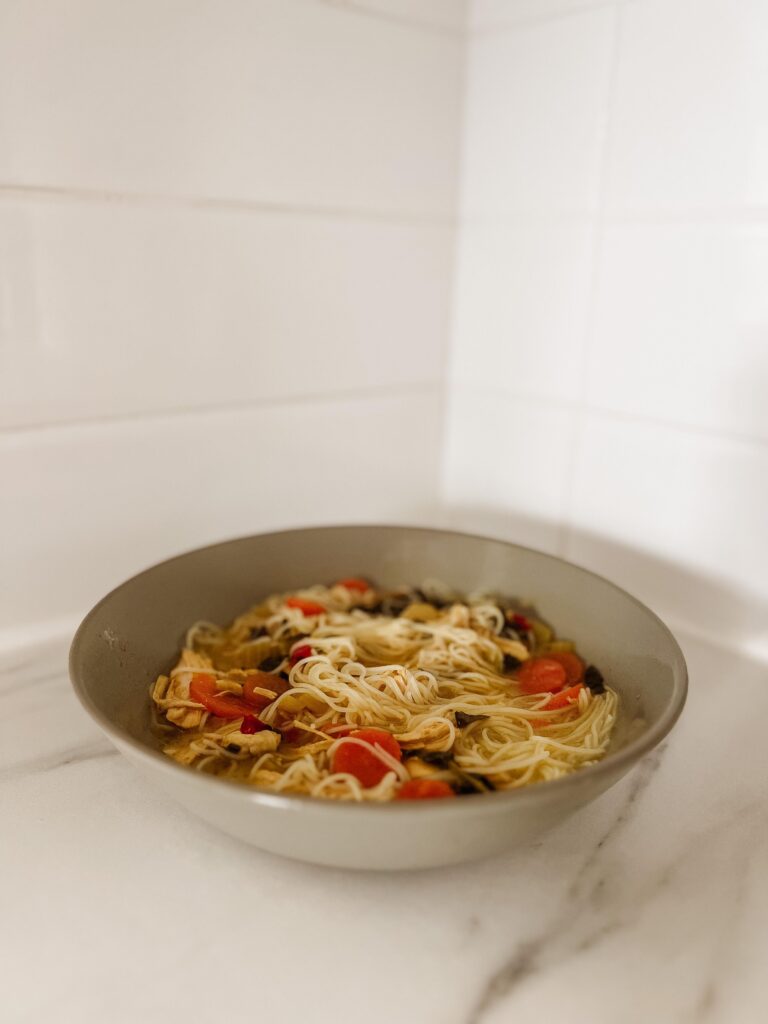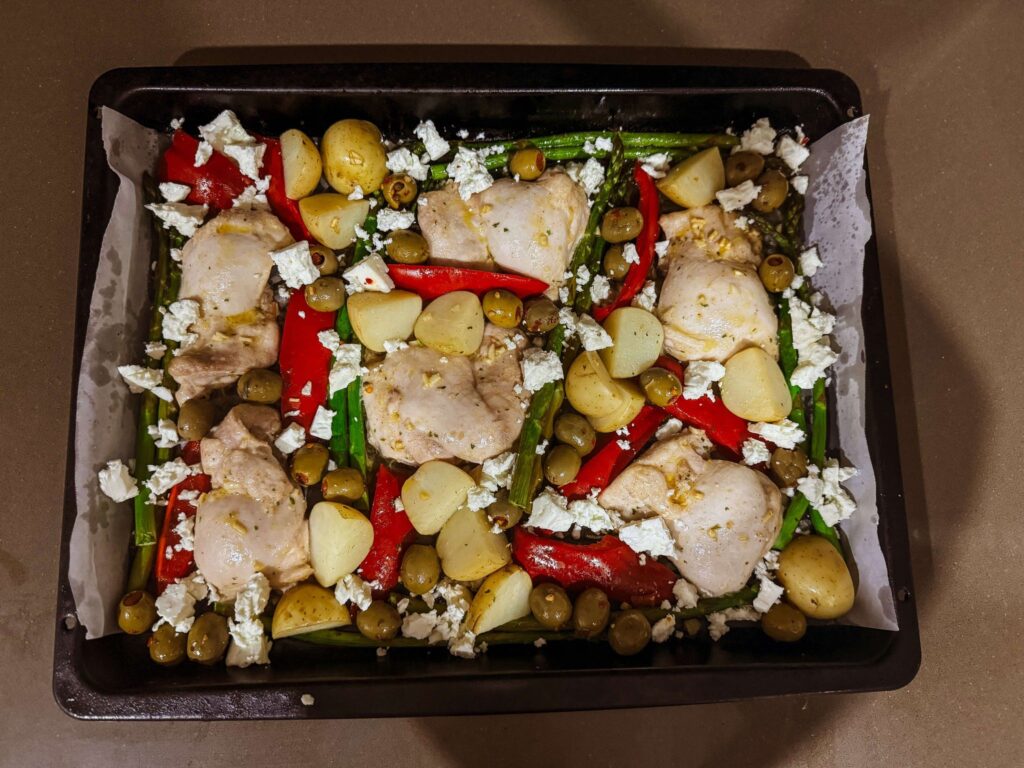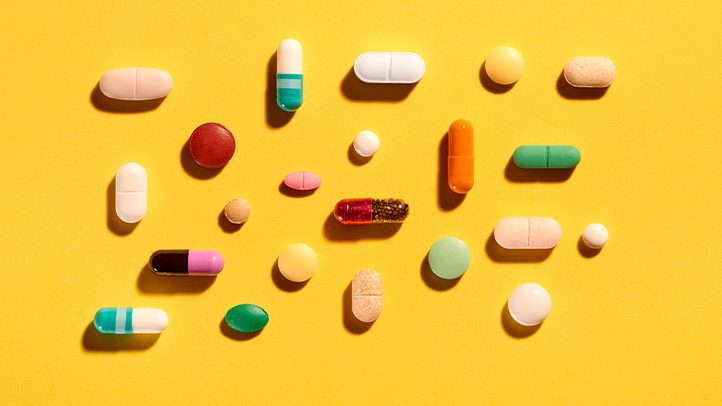Iron deficiency is the most common deficiency worldwide, especially during pregnancy. Here I will share some ways how to increase iron intake during pregnancy.

Iron deficiency or anemia can be defined as having low red blood cells or low hemoglobin.
It can be hard to distinguish an iron deficiency from normal physiological changes of pregnancy (e.g. tiredness, short of breath, weakness etc.). This is especially so during the second and third trimesters when blood volume expands increasingly to meet the demands of a growing baby.
True anemia occurs when hemoglobin levels are below 110 grams per litre.
Anemia is more common in twin pregnancies, due to folate deficiencies being eight times higher than in a singleton pregnancy (study).
In all of my singleton pregnancies, I have typically had lower levels iron and have had to be very intentional with my iron intake, particularly in the third trimester. However, I have noticed a few things that I have done in my last pregnancy that have increased my iron levels, which I will share.
What will be covered in this post
- The different types of anemia
- Iron needs in each trimester
- How to correct iron deficiency through diet
- The best forms of iron supplements to consider

The different types of anemia
Here are the most common types of anemia during pregnancy:
- Iron-deficiency anemia: the most prominent cause of anemia is low iron levels in the blood. Approximately 15-25% of all pregnant women experience an iron deficiency and up to 75% in developing nations (study).
2. Vitamin B12- deficiency anemia: this vitamin is needed for the production of iron in the blood. I will explain further down how to increase Vitamin B12 intake.
3. Folate-deficiency anemia: also necessary for the production of iron in the blood cells. I will explain further down how to increase folate or Vitamin B9 intake.
Iron needs in each trimester
First trimester
While iron is important throughout all of pregnancy, the focus in the first trimester should be on your Vitamin B9 and Vitamin B12 intake. These two vitamins are vital for your baby’s development in the first trimester as well as being crucial for the production of iron.
How to increase Vitamin B9 intake during pregnancy:
Vitamin B9, also known as folate, is needed for healthy neural tube formation, reduces the risk of midline defects, tongue ties, lip ties, cleft palate and cleft lip. It is also needed for the development of the face and heart.
Unfortunately, many women do not consume enough of this vitamin via diet, so it is recommended by mainstream medicine to take a folic acid supplement. Folic acid is the fully oxidized monoglutamate synthetic form of B9. This version does not cross the placenta the way that folate does. Folate is the natural form of B9 found in foods.
While you can consume lots of dietary folate such as beef liver (yes, small amounts are okay in pregnancy, contrary to common advice), beans, lentils, chickpeas, asparagus and strawberries, it is recommended to take a folate supplement throughout the first trimester of pregnancy. Methylated folate crosses the placenta most effectively, so this kind of supplement is recommended. Have a look at my recommended supplement here.
Foods that are rich in Vitamin B12 are tuna, salmon, cottage cheese, swiss cheese, beef and plain yoghurt.
Second trimester
Iron needs increase in the second trimester of pregnancy, as your blood volume increases by 45% to meet the demands of your baby.
Third trimester
A progressive rise in iron needs happens in the third trimester up until around 36 weeks.
You should be consuming around 27 mg of iron per day during pregnancy. However, if you are iron-deficient, you may need to consume a higher amount to correct the deficiency. I advise you to get some blood work done and consult your doctor before taking action.

How to correct iron deficiency through diet
I will explain further what kind of supplements to consider if you have been tested with an iron deficiency. However, there is still a high chance that you can correct a deficiency through diet alone.
Here are some ways to incorporate iron in your diet and some other practical tips for better iron absorption:
- Pork, chicken and beef liver (mixed in meals or eaten via capsules), duck, sardines, beef, fish, lamb, chicken (dark meat particularly), eggs, seafood if tolerated. Some non-animal sources of iron are cooked lentils, blackstrap molasses, cooked quinoa, beans, tomato, raw asparagus, cooked spinach and cooked snowpeas.
- Some ways to increase absorption: cook with an iron cast pan, do not consume iron with tannin-rich foods/beverages such as coffee and black tea, do not consume iron with calcium, soak or sprout grains before consuming (in lemon juice or apple cider vinegar for at least 4 hours).
- The probiotic strain lactobacillus plantarum 299V has been shown to improve iron status and reduce the risk of anemia (study).
If you think you may be iron deficient but have not been tested yet, here are some signs to look out for:
- heavy fatigue
- cold or tingly hands or feet
- a tight chest; not being able to take a full breath, a sense of anxiety in the chest
- pale skin, lips, inner eyelids and nails
- anemia could lead to rapid or heartbeat, dizziness, depression, hair loss, trouble concentrating, hypothyroidism and other symptoms.
Like I mentioned, if you think you might be anemic, get a thorough blood test done to confirm.

The best forms of iron supplements to consider
I do not recommend taking an iron supplement most commonly prescribed by mainstream doctors, ferrous fumarate or ferrous sulfate. This is because these are artificial forms of iron and often cause unpleasant side effects like constipation, nausea, heartburn, stomach pain and blackened stool (study).
A better alternative is taking a natural form of iron, like iron bisglycinate or ferrous bisglycinate (if repleting iron stores). These have a high rate of absorption and are unlikely to cause gastrointestinal complications.
Heme iron is animal sourced and has a very high rate of absorption.
For simply maintaining iron levels, I would suggest taking a whole foods iron supplement.
Here is the iron supplement I consume. It is a liquid iron, which absorbs well into the body. I find that after taking this for a few days, I have more energy and am less tired if my iron levels are low.
If you have any questions or would like to suggest other ways to increase iron intake, then feel free to comment below!
More on the blog
Super simple and delicious pizza scrolls for kids
Leave a Reply